Organisational Behaviour Report: Impact of OB on Team Performance
VerifiedAdded on 2021/01/01
|16
|4724
|251
Report
AI Summary
This report delves into the principles of organisational behaviour (OB) by examining the case of Sainsbury's, a major UK supermarket chain. It investigates the influence of culture, politics, and power dynamics on the organisational context, analysing how these factors impact individuals, teams, and overall performance. The report explores content and process theories of motivation, including Herzberg's two-factor theory and Vroom's expectancy theory, and their influence on employee behaviour. It also examines the relationship between culture, politics, power, and motivation in fostering team and organisational success, differentiating between effective and ineffective team structures. The report further analyses team development theories to support dynamic cooperation and concludes by summarising the relevance of OB concepts and philosophies in shaping workplace behaviour. The report provides a practical application of OB principles within a real-world business setting.
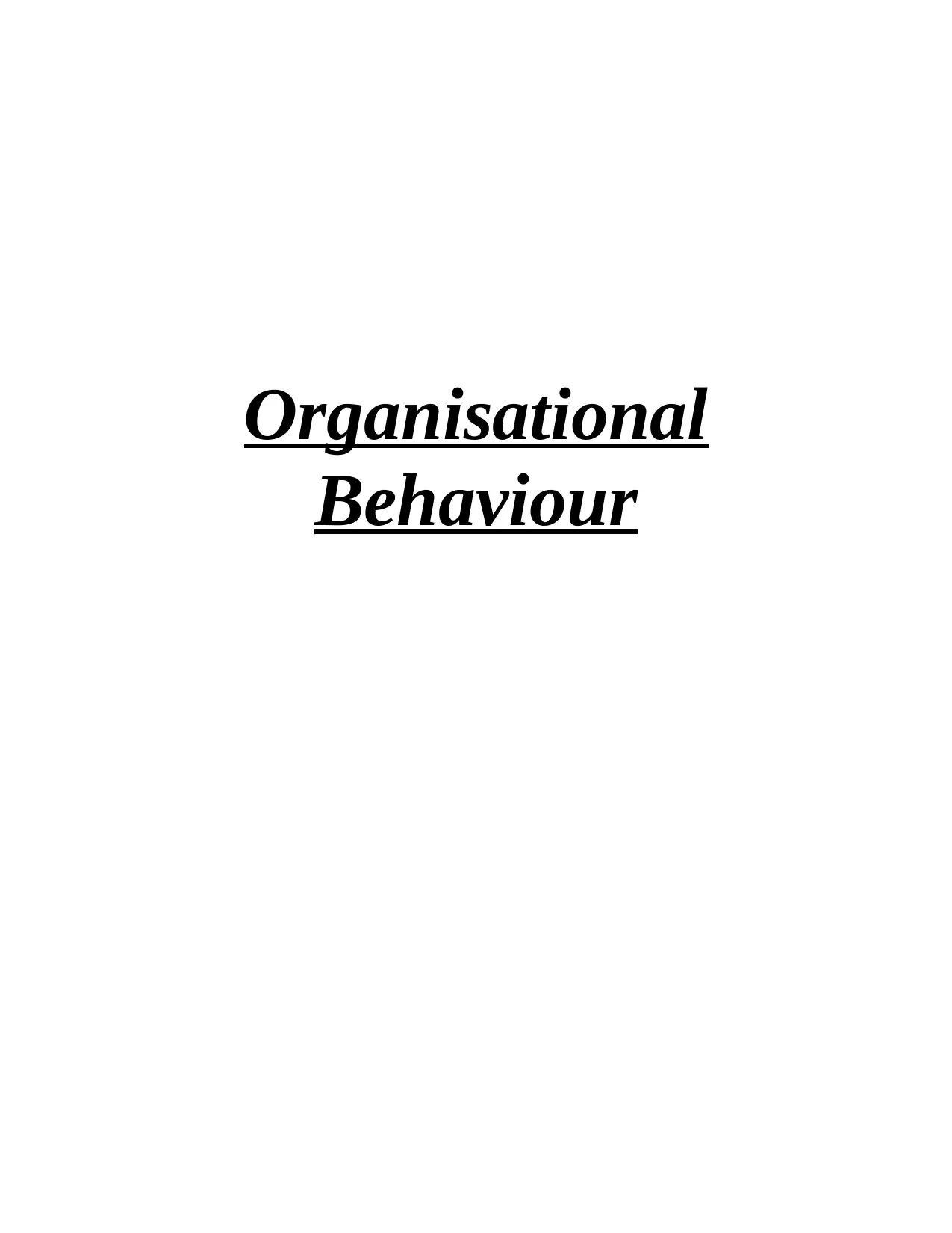
Organisational
Behaviour
Behaviour
Paraphrase This Document
Need a fresh take? Get an instant paraphrase of this document with our AI Paraphraser
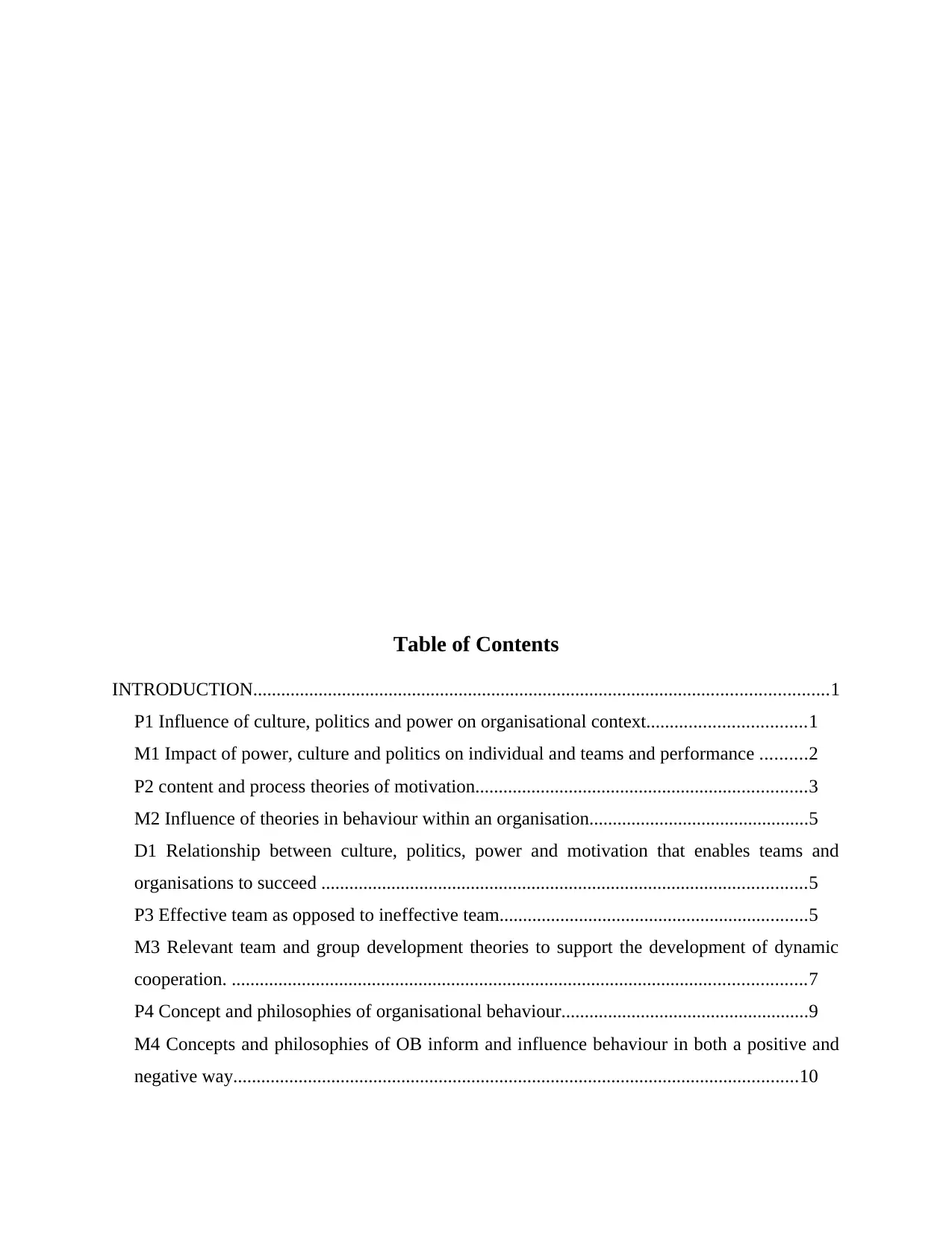
Table of Contents
INTRODUCTION...........................................................................................................................1
P1 Influence of culture, politics and power on organisational context..................................1
M1 Impact of power, culture and politics on individual and teams and performance ..........2
P2 content and process theories of motivation.......................................................................3
M2 Influence of theories in behaviour within an organisation...............................................5
D1 Relationship between culture, politics, power and motivation that enables teams and
organisations to succeed ........................................................................................................5
P3 Effective team as opposed to ineffective team..................................................................5
M3 Relevant team and group development theories to support the development of dynamic
cooperation. ...........................................................................................................................7
P4 Concept and philosophies of organisational behaviour.....................................................9
M4 Concepts and philosophies of OB inform and influence behaviour in both a positive and
negative way.........................................................................................................................10
INTRODUCTION...........................................................................................................................1
P1 Influence of culture, politics and power on organisational context..................................1
M1 Impact of power, culture and politics on individual and teams and performance ..........2
P2 content and process theories of motivation.......................................................................3
M2 Influence of theories in behaviour within an organisation...............................................5
D1 Relationship between culture, politics, power and motivation that enables teams and
organisations to succeed ........................................................................................................5
P3 Effective team as opposed to ineffective team..................................................................5
M3 Relevant team and group development theories to support the development of dynamic
cooperation. ...........................................................................................................................7
P4 Concept and philosophies of organisational behaviour.....................................................9
M4 Concepts and philosophies of OB inform and influence behaviour in both a positive and
negative way.........................................................................................................................10
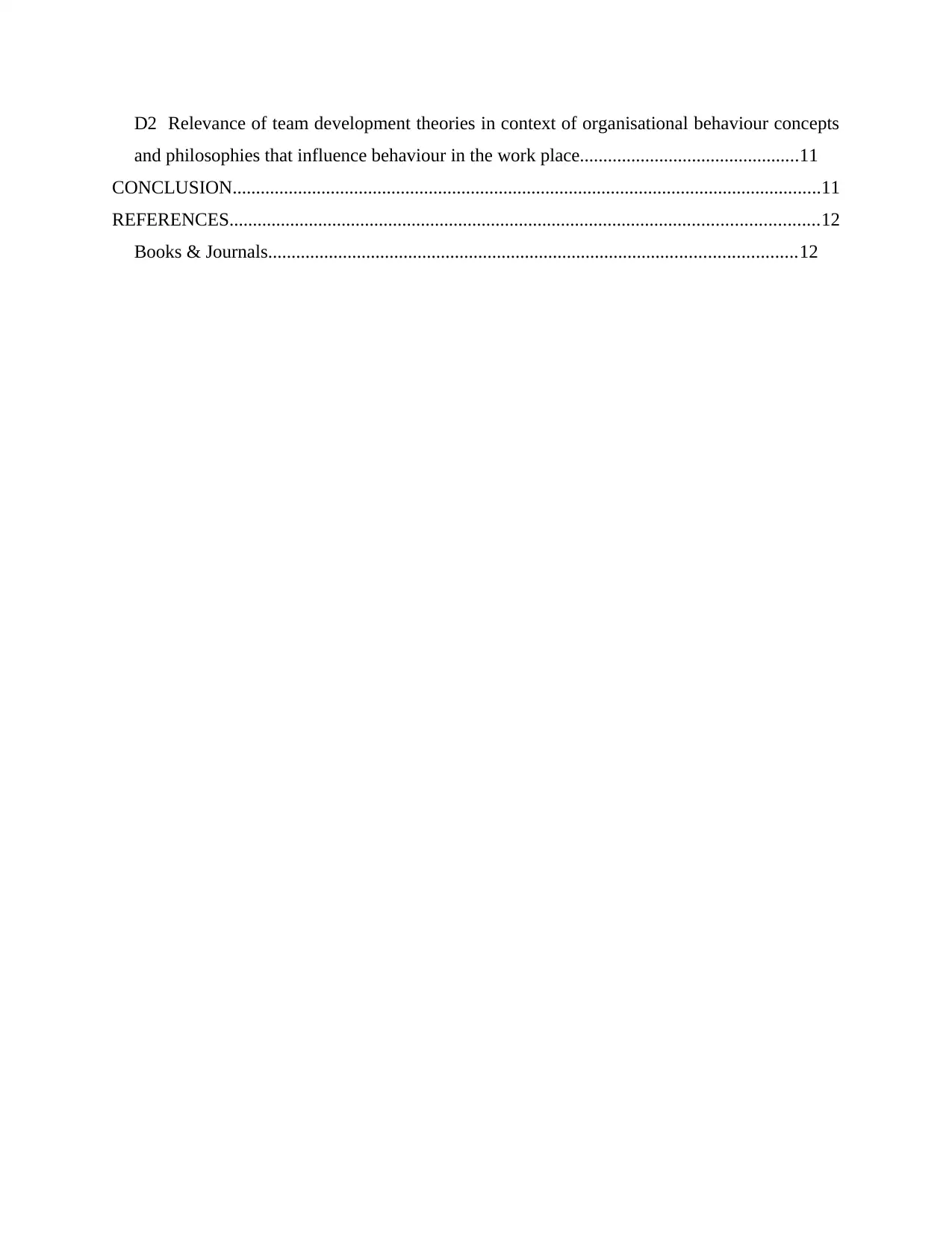
D2 Relevance of team development theories in context of organisational behaviour concepts
and philosophies that influence behaviour in the work place...............................................11
CONCLUSION..............................................................................................................................11
REFERENCES..............................................................................................................................12
Books & Journals.................................................................................................................12
and philosophies that influence behaviour in the work place...............................................11
CONCLUSION..............................................................................................................................11
REFERENCES..............................................................................................................................12
Books & Journals.................................................................................................................12
⊘ This is a preview!⊘
Do you want full access?
Subscribe today to unlock all pages.

Trusted by 1+ million students worldwide
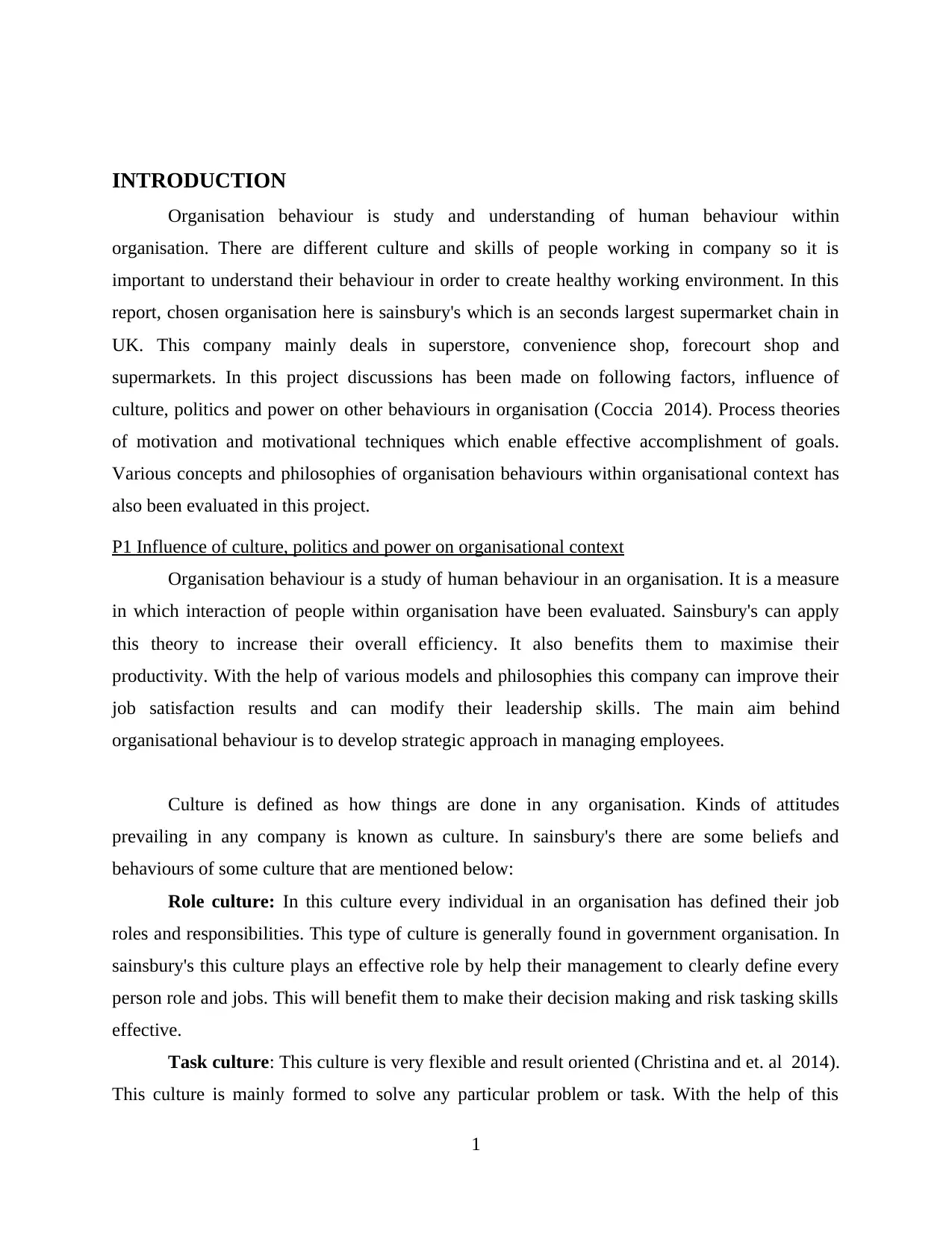
INTRODUCTION
Organisation behaviour is study and understanding of human behaviour within
organisation. There are different culture and skills of people working in company so it is
important to understand their behaviour in order to create healthy working environment. In this
report, chosen organisation here is sainsbury's which is an seconds largest supermarket chain in
UK. This company mainly deals in superstore, convenience shop, forecourt shop and
supermarkets. In this project discussions has been made on following factors, influence of
culture, politics and power on other behaviours in organisation (Coccia 2014). Process theories
of motivation and motivational techniques which enable effective accomplishment of goals.
Various concepts and philosophies of organisation behaviours within organisational context has
also been evaluated in this project.
P1 Influence of culture, politics and power on organisational context
Organisation behaviour is a study of human behaviour in an organisation. It is a measure
in which interaction of people within organisation have been evaluated. Sainsbury's can apply
this theory to increase their overall efficiency. It also benefits them to maximise their
productivity. With the help of various models and philosophies this company can improve their
job satisfaction results and can modify their leadership skills. The main aim behind
organisational behaviour is to develop strategic approach in managing employees.
Culture is defined as how things are done in any organisation. Kinds of attitudes
prevailing in any company is known as culture. In sainsbury's there are some beliefs and
behaviours of some culture that are mentioned below:
Role culture: In this culture every individual in an organisation has defined their job
roles and responsibilities. This type of culture is generally found in government organisation. In
sainsbury's this culture plays an effective role by help their management to clearly define every
person role and jobs. This will benefit them to make their decision making and risk tasking skills
effective.
Task culture: This culture is very flexible and result oriented (Christina and et. al 2014).
This culture is mainly formed to solve any particular problem or task. With the help of this
1
Organisation behaviour is study and understanding of human behaviour within
organisation. There are different culture and skills of people working in company so it is
important to understand their behaviour in order to create healthy working environment. In this
report, chosen organisation here is sainsbury's which is an seconds largest supermarket chain in
UK. This company mainly deals in superstore, convenience shop, forecourt shop and
supermarkets. In this project discussions has been made on following factors, influence of
culture, politics and power on other behaviours in organisation (Coccia 2014). Process theories
of motivation and motivational techniques which enable effective accomplishment of goals.
Various concepts and philosophies of organisation behaviours within organisational context has
also been evaluated in this project.
P1 Influence of culture, politics and power on organisational context
Organisation behaviour is a study of human behaviour in an organisation. It is a measure
in which interaction of people within organisation have been evaluated. Sainsbury's can apply
this theory to increase their overall efficiency. It also benefits them to maximise their
productivity. With the help of various models and philosophies this company can improve their
job satisfaction results and can modify their leadership skills. The main aim behind
organisational behaviour is to develop strategic approach in managing employees.
Culture is defined as how things are done in any organisation. Kinds of attitudes
prevailing in any company is known as culture. In sainsbury's there are some beliefs and
behaviours of some culture that are mentioned below:
Role culture: In this culture every individual in an organisation has defined their job
roles and responsibilities. This type of culture is generally found in government organisation. In
sainsbury's this culture plays an effective role by help their management to clearly define every
person role and jobs. This will benefit them to make their decision making and risk tasking skills
effective.
Task culture: This culture is very flexible and result oriented (Christina and et. al 2014).
This culture is mainly formed to solve any particular problem or task. With the help of this
1
Paraphrase This Document
Need a fresh take? Get an instant paraphrase of this document with our AI Paraphraser
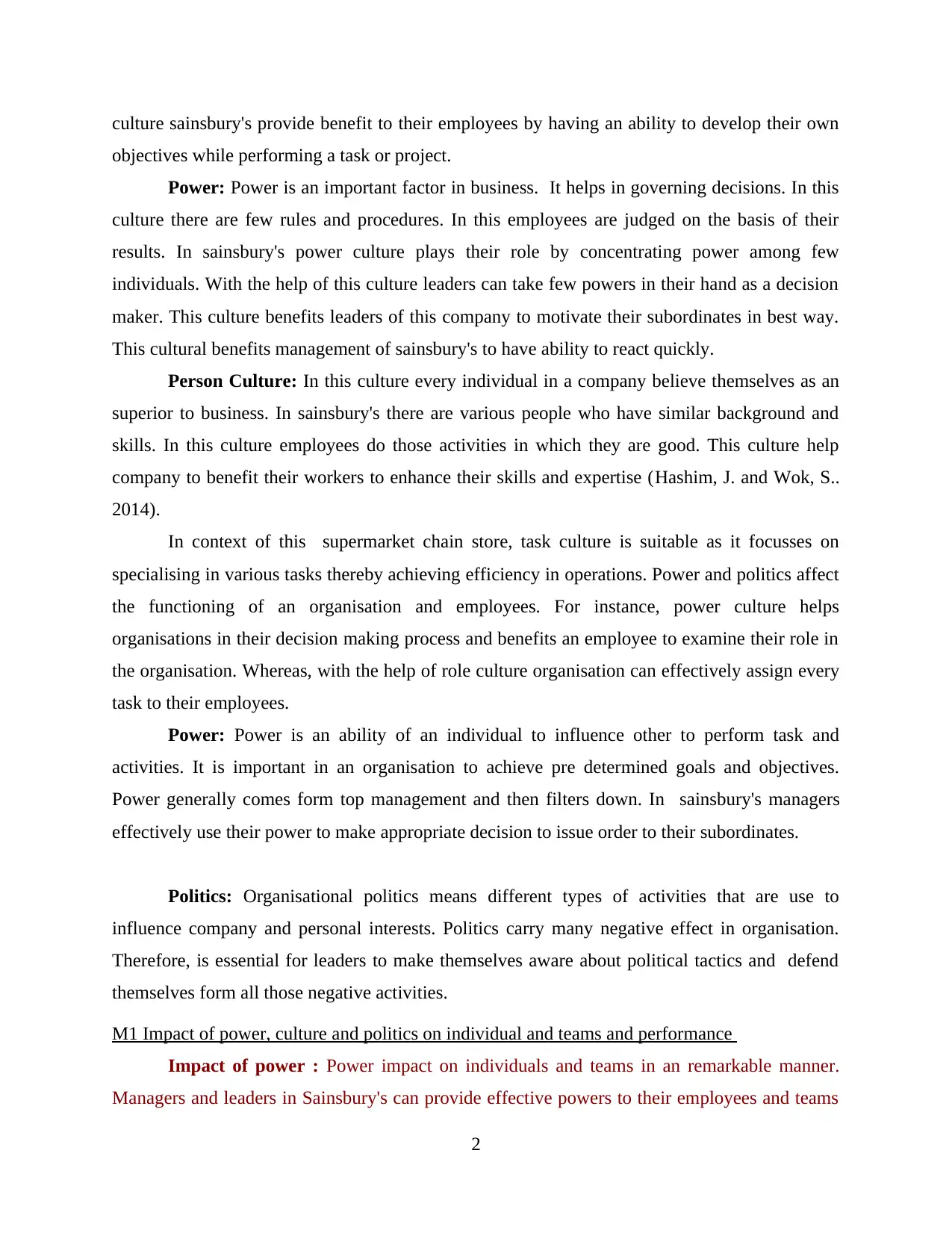
culture sainsbury's provide benefit to their employees by having an ability to develop their own
objectives while performing a task or project.
Power: Power is an important factor in business. It helps in governing decisions. In this
culture there are few rules and procedures. In this employees are judged on the basis of their
results. In sainsbury's power culture plays their role by concentrating power among few
individuals. With the help of this culture leaders can take few powers in their hand as a decision
maker. This culture benefits leaders of this company to motivate their subordinates in best way.
This cultural benefits management of sainsbury's to have ability to react quickly.
Person Culture: In this culture every individual in a company believe themselves as an
superior to business. In sainsbury's there are various people who have similar background and
skills. In this culture employees do those activities in which they are good. This culture help
company to benefit their workers to enhance their skills and expertise (Hashim, J. and Wok, S..
2014).
In context of this supermarket chain store, task culture is suitable as it focusses on
specialising in various tasks thereby achieving efficiency in operations. Power and politics affect
the functioning of an organisation and employees. For instance, power culture helps
organisations in their decision making process and benefits an employee to examine their role in
the organisation. Whereas, with the help of role culture organisation can effectively assign every
task to their employees.
Power: Power is an ability of an individual to influence other to perform task and
activities. It is important in an organisation to achieve pre determined goals and objectives.
Power generally comes form top management and then filters down. In sainsbury's managers
effectively use their power to make appropriate decision to issue order to their subordinates.
Politics: Organisational politics means different types of activities that are use to
influence company and personal interests. Politics carry many negative effect in organisation.
Therefore, is essential for leaders to make themselves aware about political tactics and defend
themselves form all those negative activities.
M1 Impact of power, culture and politics on individual and teams and performance
Impact of power : Power impact on individuals and teams in an remarkable manner.
Managers and leaders in Sainsbury's can provide effective powers to their employees and teams
2
objectives while performing a task or project.
Power: Power is an important factor in business. It helps in governing decisions. In this
culture there are few rules and procedures. In this employees are judged on the basis of their
results. In sainsbury's power culture plays their role by concentrating power among few
individuals. With the help of this culture leaders can take few powers in their hand as a decision
maker. This culture benefits leaders of this company to motivate their subordinates in best way.
This cultural benefits management of sainsbury's to have ability to react quickly.
Person Culture: In this culture every individual in a company believe themselves as an
superior to business. In sainsbury's there are various people who have similar background and
skills. In this culture employees do those activities in which they are good. This culture help
company to benefit their workers to enhance their skills and expertise (Hashim, J. and Wok, S..
2014).
In context of this supermarket chain store, task culture is suitable as it focusses on
specialising in various tasks thereby achieving efficiency in operations. Power and politics affect
the functioning of an organisation and employees. For instance, power culture helps
organisations in their decision making process and benefits an employee to examine their role in
the organisation. Whereas, with the help of role culture organisation can effectively assign every
task to their employees.
Power: Power is an ability of an individual to influence other to perform task and
activities. It is important in an organisation to achieve pre determined goals and objectives.
Power generally comes form top management and then filters down. In sainsbury's managers
effectively use their power to make appropriate decision to issue order to their subordinates.
Politics: Organisational politics means different types of activities that are use to
influence company and personal interests. Politics carry many negative effect in organisation.
Therefore, is essential for leaders to make themselves aware about political tactics and defend
themselves form all those negative activities.
M1 Impact of power, culture and politics on individual and teams and performance
Impact of power : Power impact on individuals and teams in an remarkable manner.
Managers and leaders in Sainsbury's can provide effective powers to their employees and teams
2
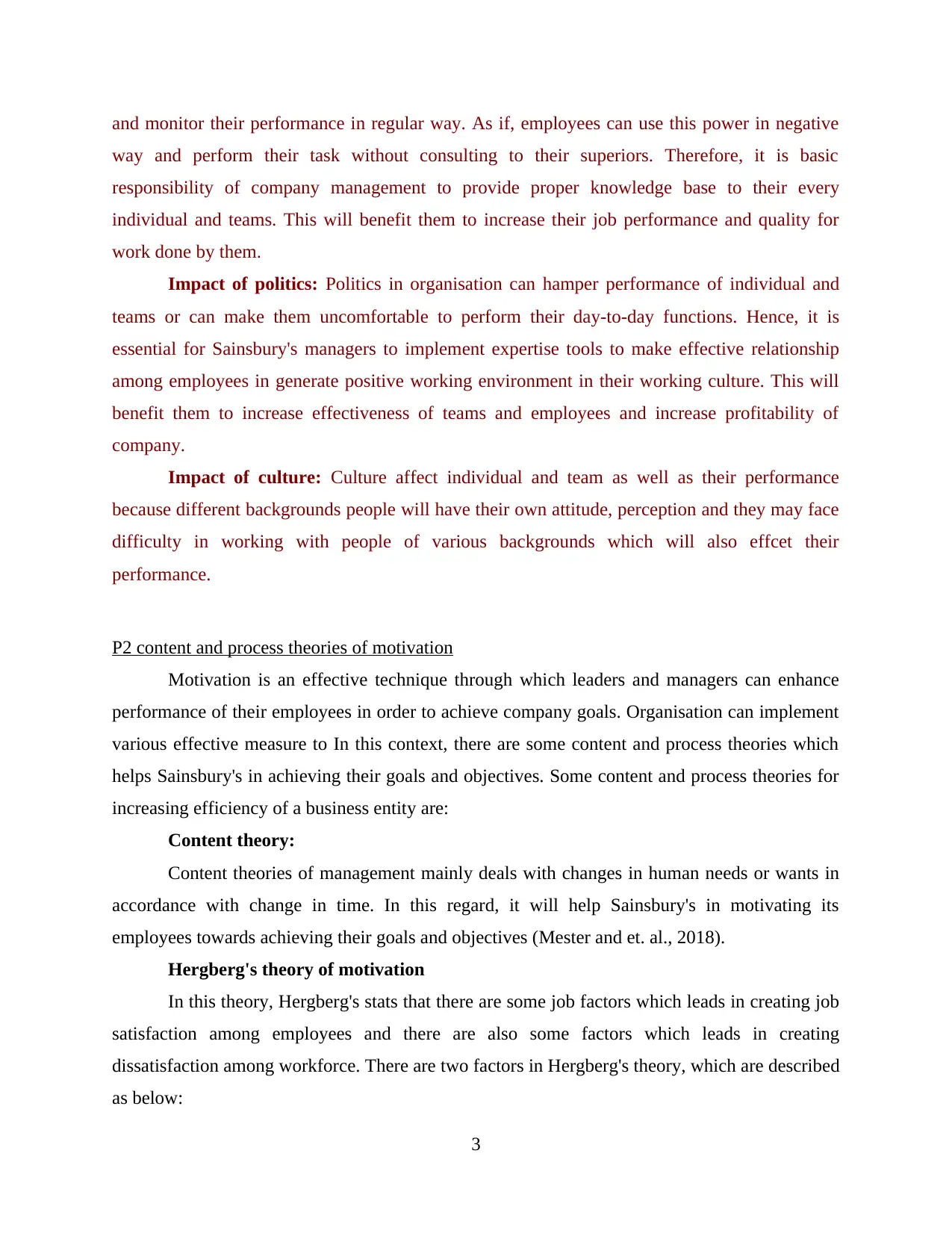
and monitor their performance in regular way. As if, employees can use this power in negative
way and perform their task without consulting to their superiors. Therefore, it is basic
responsibility of company management to provide proper knowledge base to their every
individual and teams. This will benefit them to increase their job performance and quality for
work done by them.
Impact of politics: Politics in organisation can hamper performance of individual and
teams or can make them uncomfortable to perform their day-to-day functions. Hence, it is
essential for Sainsbury's managers to implement expertise tools to make effective relationship
among employees in generate positive working environment in their working culture. This will
benefit them to increase effectiveness of teams and employees and increase profitability of
company.
Impact of culture: Culture affect individual and team as well as their performance
because different backgrounds people will have their own attitude, perception and they may face
difficulty in working with people of various backgrounds which will also effcet their
performance.
P2 content and process theories of motivation
Motivation is an effective technique through which leaders and managers can enhance
performance of their employees in order to achieve company goals. Organisation can implement
various effective measure to In this context, there are some content and process theories which
helps Sainsbury's in achieving their goals and objectives. Some content and process theories for
increasing efficiency of a business entity are:
Content theory:
Content theories of management mainly deals with changes in human needs or wants in
accordance with change in time. In this regard, it will help Sainsbury's in motivating its
employees towards achieving their goals and objectives (Mester and et. al., 2018).
Hergberg's theory of motivation
In this theory, Hergberg's stats that there are some job factors which leads in creating job
satisfaction among employees and there are also some factors which leads in creating
dissatisfaction among workforce. There are two factors in Hergberg's theory, which are described
as below:
3
way and perform their task without consulting to their superiors. Therefore, it is basic
responsibility of company management to provide proper knowledge base to their every
individual and teams. This will benefit them to increase their job performance and quality for
work done by them.
Impact of politics: Politics in organisation can hamper performance of individual and
teams or can make them uncomfortable to perform their day-to-day functions. Hence, it is
essential for Sainsbury's managers to implement expertise tools to make effective relationship
among employees in generate positive working environment in their working culture. This will
benefit them to increase effectiveness of teams and employees and increase profitability of
company.
Impact of culture: Culture affect individual and team as well as their performance
because different backgrounds people will have their own attitude, perception and they may face
difficulty in working with people of various backgrounds which will also effcet their
performance.
P2 content and process theories of motivation
Motivation is an effective technique through which leaders and managers can enhance
performance of their employees in order to achieve company goals. Organisation can implement
various effective measure to In this context, there are some content and process theories which
helps Sainsbury's in achieving their goals and objectives. Some content and process theories for
increasing efficiency of a business entity are:
Content theory:
Content theories of management mainly deals with changes in human needs or wants in
accordance with change in time. In this regard, it will help Sainsbury's in motivating its
employees towards achieving their goals and objectives (Mester and et. al., 2018).
Hergberg's theory of motivation
In this theory, Hergberg's stats that there are some job factors which leads in creating job
satisfaction among employees and there are also some factors which leads in creating
dissatisfaction among workforce. There are two factors in Hergberg's theory, which are described
as below:
3
⊘ This is a preview!⊘
Do you want full access?
Subscribe today to unlock all pages.

Trusted by 1+ million students worldwide
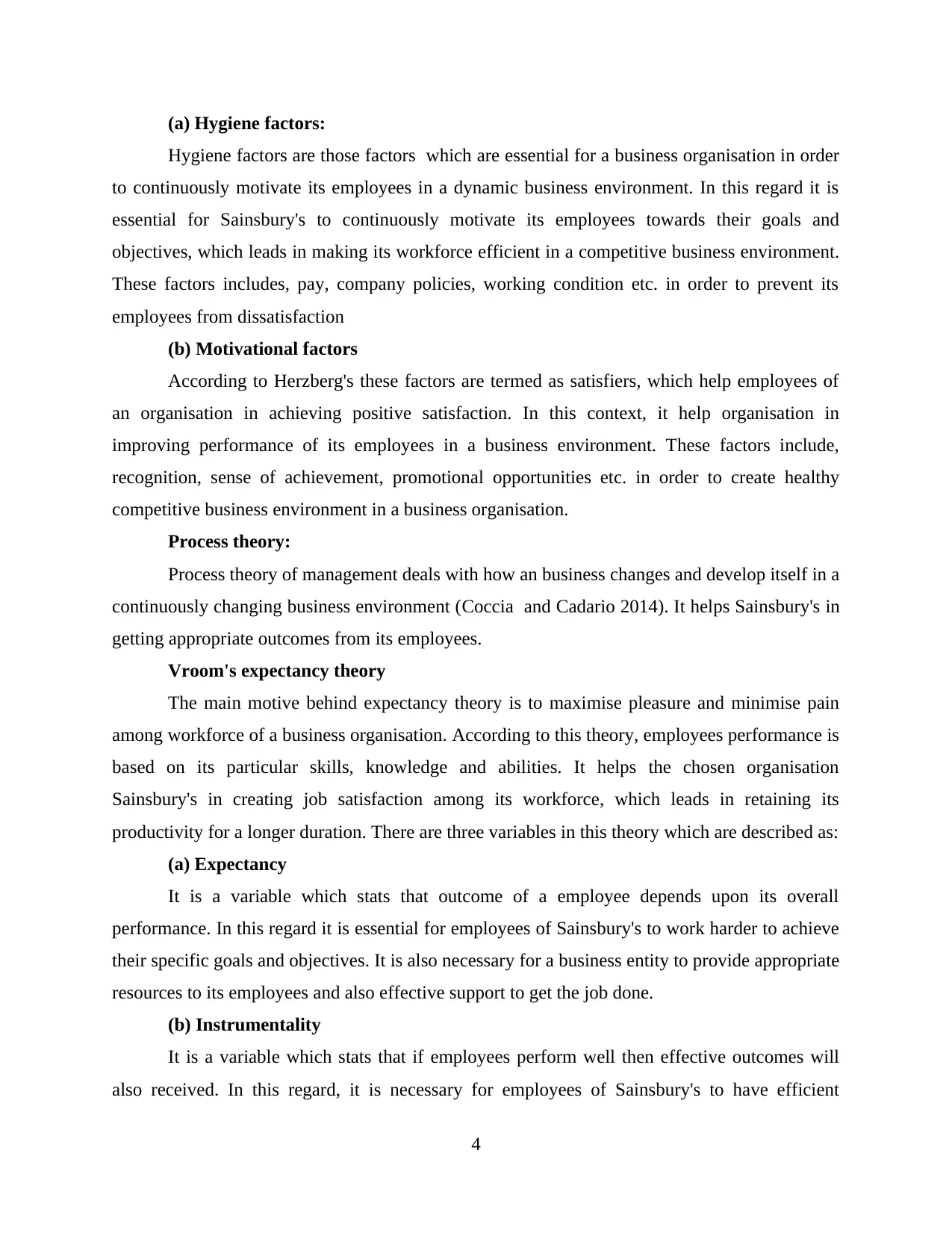
(a) Hygiene factors:
Hygiene factors are those factors which are essential for a business organisation in order
to continuously motivate its employees in a dynamic business environment. In this regard it is
essential for Sainsbury's to continuously motivate its employees towards their goals and
objectives, which leads in making its workforce efficient in a competitive business environment.
These factors includes, pay, company policies, working condition etc. in order to prevent its
employees from dissatisfaction
(b) Motivational factors
According to Herzberg's these factors are termed as satisfiers, which help employees of
an organisation in achieving positive satisfaction. In this context, it help organisation in
improving performance of its employees in a business environment. These factors include,
recognition, sense of achievement, promotional opportunities etc. in order to create healthy
competitive business environment in a business organisation.
Process theory:
Process theory of management deals with how an business changes and develop itself in a
continuously changing business environment (Coccia and Cadario 2014). It helps Sainsbury's in
getting appropriate outcomes from its employees.
Vroom's expectancy theory
The main motive behind expectancy theory is to maximise pleasure and minimise pain
among workforce of a business organisation. According to this theory, employees performance is
based on its particular skills, knowledge and abilities. It helps the chosen organisation
Sainsbury's in creating job satisfaction among its workforce, which leads in retaining its
productivity for a longer duration. There are three variables in this theory which are described as:
(a) Expectancy
It is a variable which stats that outcome of a employee depends upon its overall
performance. In this regard it is essential for employees of Sainsbury's to work harder to achieve
their specific goals and objectives. It is also necessary for a business entity to provide appropriate
resources to its employees and also effective support to get the job done.
(b) Instrumentality
It is a variable which stats that if employees perform well then effective outcomes will
also received. In this regard, it is necessary for employees of Sainsbury's to have efficient
4
Hygiene factors are those factors which are essential for a business organisation in order
to continuously motivate its employees in a dynamic business environment. In this regard it is
essential for Sainsbury's to continuously motivate its employees towards their goals and
objectives, which leads in making its workforce efficient in a competitive business environment.
These factors includes, pay, company policies, working condition etc. in order to prevent its
employees from dissatisfaction
(b) Motivational factors
According to Herzberg's these factors are termed as satisfiers, which help employees of
an organisation in achieving positive satisfaction. In this context, it help organisation in
improving performance of its employees in a business environment. These factors include,
recognition, sense of achievement, promotional opportunities etc. in order to create healthy
competitive business environment in a business organisation.
Process theory:
Process theory of management deals with how an business changes and develop itself in a
continuously changing business environment (Coccia and Cadario 2014). It helps Sainsbury's in
getting appropriate outcomes from its employees.
Vroom's expectancy theory
The main motive behind expectancy theory is to maximise pleasure and minimise pain
among workforce of a business organisation. According to this theory, employees performance is
based on its particular skills, knowledge and abilities. It helps the chosen organisation
Sainsbury's in creating job satisfaction among its workforce, which leads in retaining its
productivity for a longer duration. There are three variables in this theory which are described as:
(a) Expectancy
It is a variable which stats that outcome of a employee depends upon its overall
performance. In this regard it is essential for employees of Sainsbury's to work harder to achieve
their specific goals and objectives. It is also necessary for a business entity to provide appropriate
resources to its employees and also effective support to get the job done.
(b) Instrumentality
It is a variable which stats that if employees perform well then effective outcomes will
also received. In this regard, it is necessary for employees of Sainsbury's to have efficient
4
Paraphrase This Document
Need a fresh take? Get an instant paraphrase of this document with our AI Paraphraser
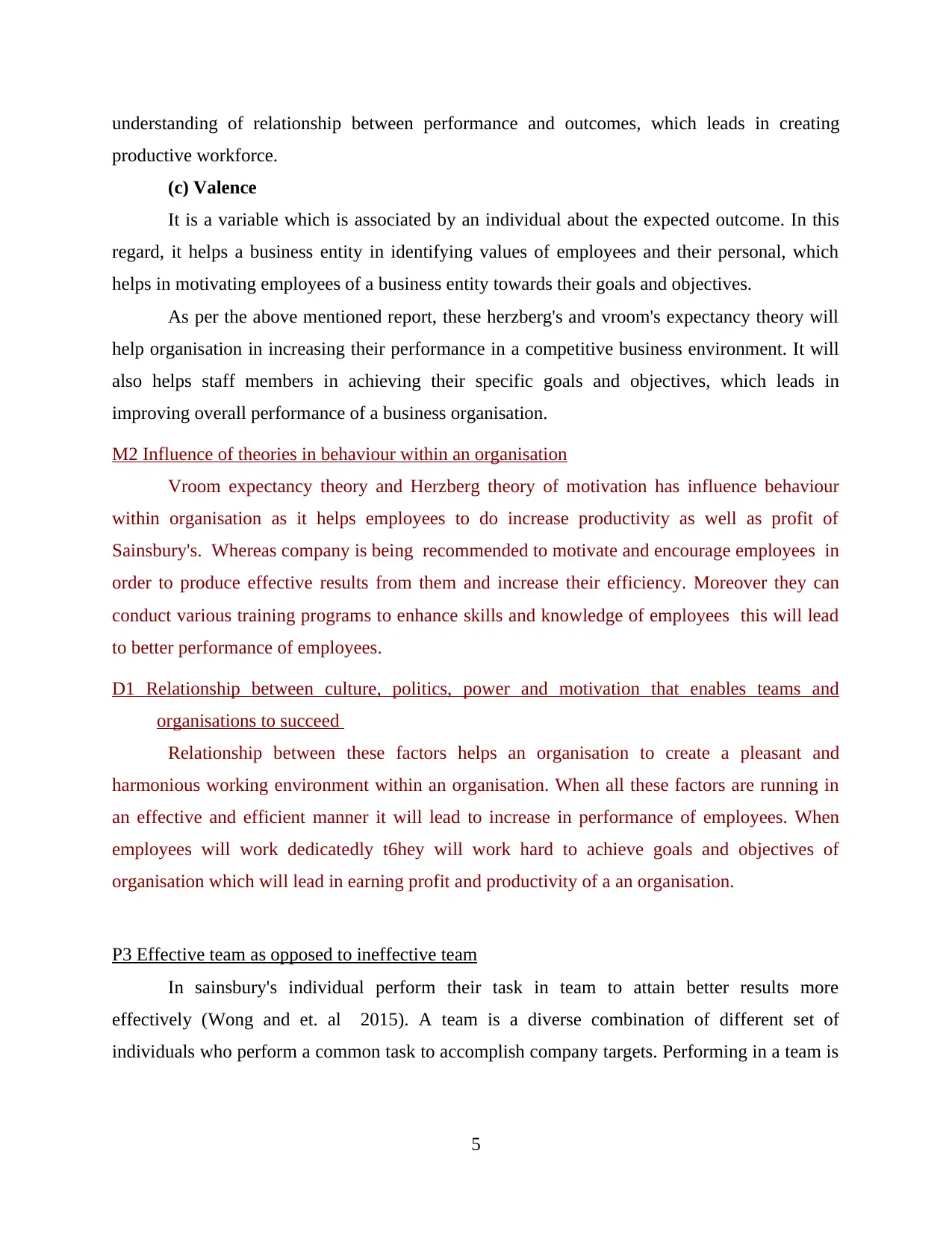
understanding of relationship between performance and outcomes, which leads in creating
productive workforce.
(c) Valence
It is a variable which is associated by an individual about the expected outcome. In this
regard, it helps a business entity in identifying values of employees and their personal, which
helps in motivating employees of a business entity towards their goals and objectives.
As per the above mentioned report, these herzberg's and vroom's expectancy theory will
help organisation in increasing their performance in a competitive business environment. It will
also helps staff members in achieving their specific goals and objectives, which leads in
improving overall performance of a business organisation.
M2 Influence of theories in behaviour within an organisation
Vroom expectancy theory and Herzberg theory of motivation has influence behaviour
within organisation as it helps employees to do increase productivity as well as profit of
Sainsbury's. Whereas company is being recommended to motivate and encourage employees in
order to produce effective results from them and increase their efficiency. Moreover they can
conduct various training programs to enhance skills and knowledge of employees this will lead
to better performance of employees.
D1 Relationship between culture, politics, power and motivation that enables teams and
organisations to succeed
Relationship between these factors helps an organisation to create a pleasant and
harmonious working environment within an organisation. When all these factors are running in
an effective and efficient manner it will lead to increase in performance of employees. When
employees will work dedicatedly t6hey will work hard to achieve goals and objectives of
organisation which will lead in earning profit and productivity of a an organisation.
P3 Effective team as opposed to ineffective team
In sainsbury's individual perform their task in team to attain better results more
effectively (Wong and et. al 2015). A team is a diverse combination of different set of
individuals who perform a common task to accomplish company targets. Performing in a team is
5
productive workforce.
(c) Valence
It is a variable which is associated by an individual about the expected outcome. In this
regard, it helps a business entity in identifying values of employees and their personal, which
helps in motivating employees of a business entity towards their goals and objectives.
As per the above mentioned report, these herzberg's and vroom's expectancy theory will
help organisation in increasing their performance in a competitive business environment. It will
also helps staff members in achieving their specific goals and objectives, which leads in
improving overall performance of a business organisation.
M2 Influence of theories in behaviour within an organisation
Vroom expectancy theory and Herzberg theory of motivation has influence behaviour
within organisation as it helps employees to do increase productivity as well as profit of
Sainsbury's. Whereas company is being recommended to motivate and encourage employees in
order to produce effective results from them and increase their efficiency. Moreover they can
conduct various training programs to enhance skills and knowledge of employees this will lead
to better performance of employees.
D1 Relationship between culture, politics, power and motivation that enables teams and
organisations to succeed
Relationship between these factors helps an organisation to create a pleasant and
harmonious working environment within an organisation. When all these factors are running in
an effective and efficient manner it will lead to increase in performance of employees. When
employees will work dedicatedly t6hey will work hard to achieve goals and objectives of
organisation which will lead in earning profit and productivity of a an organisation.
P3 Effective team as opposed to ineffective team
In sainsbury's individual perform their task in team to attain better results more
effectively (Wong and et. al 2015). A team is a diverse combination of different set of
individuals who perform a common task to accomplish company targets. Performing in a team is
5
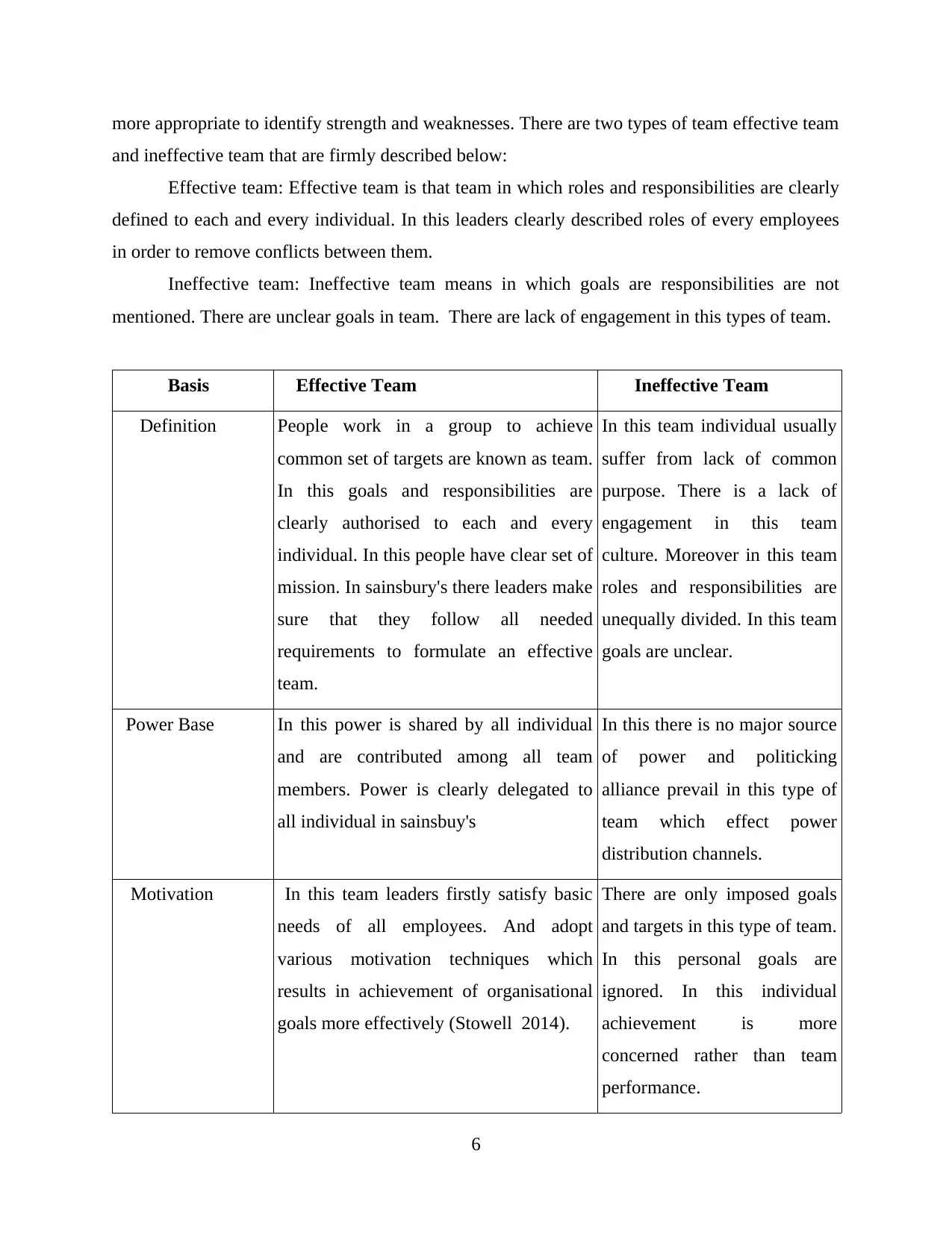
more appropriate to identify strength and weaknesses. There are two types of team effective team
and ineffective team that are firmly described below:
Effective team: Effective team is that team in which roles and responsibilities are clearly
defined to each and every individual. In this leaders clearly described roles of every employees
in order to remove conflicts between them.
Ineffective team: Ineffective team means in which goals are responsibilities are not
mentioned. There are unclear goals in team. There are lack of engagement in this types of team.
Basis Effective Team Ineffective Team
Definition People work in a group to achieve
common set of targets are known as team.
In this goals and responsibilities are
clearly authorised to each and every
individual. In this people have clear set of
mission. In sainsbury's there leaders make
sure that they follow all needed
requirements to formulate an effective
team.
In this team individual usually
suffer from lack of common
purpose. There is a lack of
engagement in this team
culture. Moreover in this team
roles and responsibilities are
unequally divided. In this team
goals are unclear.
Power Base In this power is shared by all individual
and are contributed among all team
members. Power is clearly delegated to
all individual in sainsbuy's
In this there is no major source
of power and politicking
alliance prevail in this type of
team which effect power
distribution channels.
Motivation In this team leaders firstly satisfy basic
needs of all employees. And adopt
various motivation techniques which
results in achievement of organisational
goals more effectively (Stowell 2014).
There are only imposed goals
and targets in this type of team.
In this personal goals are
ignored. In this individual
achievement is more
concerned rather than team
performance.
6
and ineffective team that are firmly described below:
Effective team: Effective team is that team in which roles and responsibilities are clearly
defined to each and every individual. In this leaders clearly described roles of every employees
in order to remove conflicts between them.
Ineffective team: Ineffective team means in which goals are responsibilities are not
mentioned. There are unclear goals in team. There are lack of engagement in this types of team.
Basis Effective Team Ineffective Team
Definition People work in a group to achieve
common set of targets are known as team.
In this goals and responsibilities are
clearly authorised to each and every
individual. In this people have clear set of
mission. In sainsbury's there leaders make
sure that they follow all needed
requirements to formulate an effective
team.
In this team individual usually
suffer from lack of common
purpose. There is a lack of
engagement in this team
culture. Moreover in this team
roles and responsibilities are
unequally divided. In this team
goals are unclear.
Power Base In this power is shared by all individual
and are contributed among all team
members. Power is clearly delegated to
all individual in sainsbuy's
In this there is no major source
of power and politicking
alliance prevail in this type of
team which effect power
distribution channels.
Motivation In this team leaders firstly satisfy basic
needs of all employees. And adopt
various motivation techniques which
results in achievement of organisational
goals more effectively (Stowell 2014).
There are only imposed goals
and targets in this type of team.
In this personal goals are
ignored. In this individual
achievement is more
concerned rather than team
performance.
6
⊘ This is a preview!⊘
Do you want full access?
Subscribe today to unlock all pages.

Trusted by 1+ million students worldwide
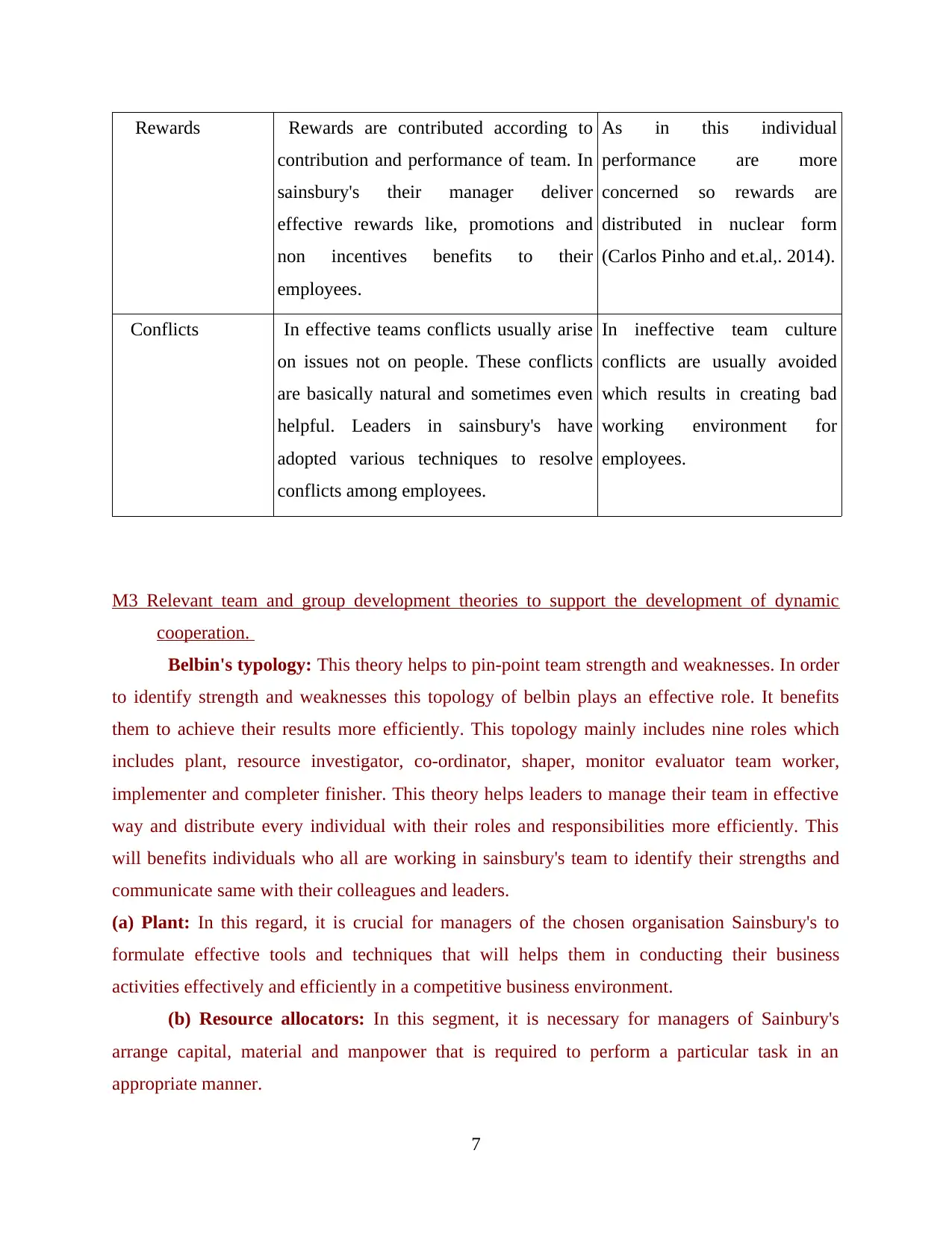
Rewards Rewards are contributed according to
contribution and performance of team. In
sainsbury's their manager deliver
effective rewards like, promotions and
non incentives benefits to their
employees.
As in this individual
performance are more
concerned so rewards are
distributed in nuclear form
(Carlos Pinho and et.al,. 2014).
Conflicts In effective teams conflicts usually arise
on issues not on people. These conflicts
are basically natural and sometimes even
helpful. Leaders in sainsbury's have
adopted various techniques to resolve
conflicts among employees.
In ineffective team culture
conflicts are usually avoided
which results in creating bad
working environment for
employees.
M3 Relevant team and group development theories to support the development of dynamic
cooperation.
Belbin's typology: This theory helps to pin-point team strength and weaknesses. In order
to identify strength and weaknesses this topology of belbin plays an effective role. It benefits
them to achieve their results more efficiently. This topology mainly includes nine roles which
includes plant, resource investigator, co-ordinator, shaper, monitor evaluator team worker,
implementer and completer finisher. This theory helps leaders to manage their team in effective
way and distribute every individual with their roles and responsibilities more efficiently. This
will benefits individuals who all are working in sainsbury's team to identify their strengths and
communicate same with their colleagues and leaders.
(a) Plant: In this regard, it is crucial for managers of the chosen organisation Sainsbury's to
formulate effective tools and techniques that will helps them in conducting their business
activities effectively and efficiently in a competitive business environment.
(b) Resource allocators: In this segment, it is necessary for managers of Sainbury's
arrange capital, material and manpower that is required to perform a particular task in an
appropriate manner.
7
contribution and performance of team. In
sainsbury's their manager deliver
effective rewards like, promotions and
non incentives benefits to their
employees.
As in this individual
performance are more
concerned so rewards are
distributed in nuclear form
(Carlos Pinho and et.al,. 2014).
Conflicts In effective teams conflicts usually arise
on issues not on people. These conflicts
are basically natural and sometimes even
helpful. Leaders in sainsbury's have
adopted various techniques to resolve
conflicts among employees.
In ineffective team culture
conflicts are usually avoided
which results in creating bad
working environment for
employees.
M3 Relevant team and group development theories to support the development of dynamic
cooperation.
Belbin's typology: This theory helps to pin-point team strength and weaknesses. In order
to identify strength and weaknesses this topology of belbin plays an effective role. It benefits
them to achieve their results more efficiently. This topology mainly includes nine roles which
includes plant, resource investigator, co-ordinator, shaper, monitor evaluator team worker,
implementer and completer finisher. This theory helps leaders to manage their team in effective
way and distribute every individual with their roles and responsibilities more efficiently. This
will benefits individuals who all are working in sainsbury's team to identify their strengths and
communicate same with their colleagues and leaders.
(a) Plant: In this regard, it is crucial for managers of the chosen organisation Sainsbury's to
formulate effective tools and techniques that will helps them in conducting their business
activities effectively and efficiently in a competitive business environment.
(b) Resource allocators: In this segment, it is necessary for managers of Sainbury's
arrange capital, material and manpower that is required to perform a particular task in an
appropriate manner.
7
Paraphrase This Document
Need a fresh take? Get an instant paraphrase of this document with our AI Paraphraser
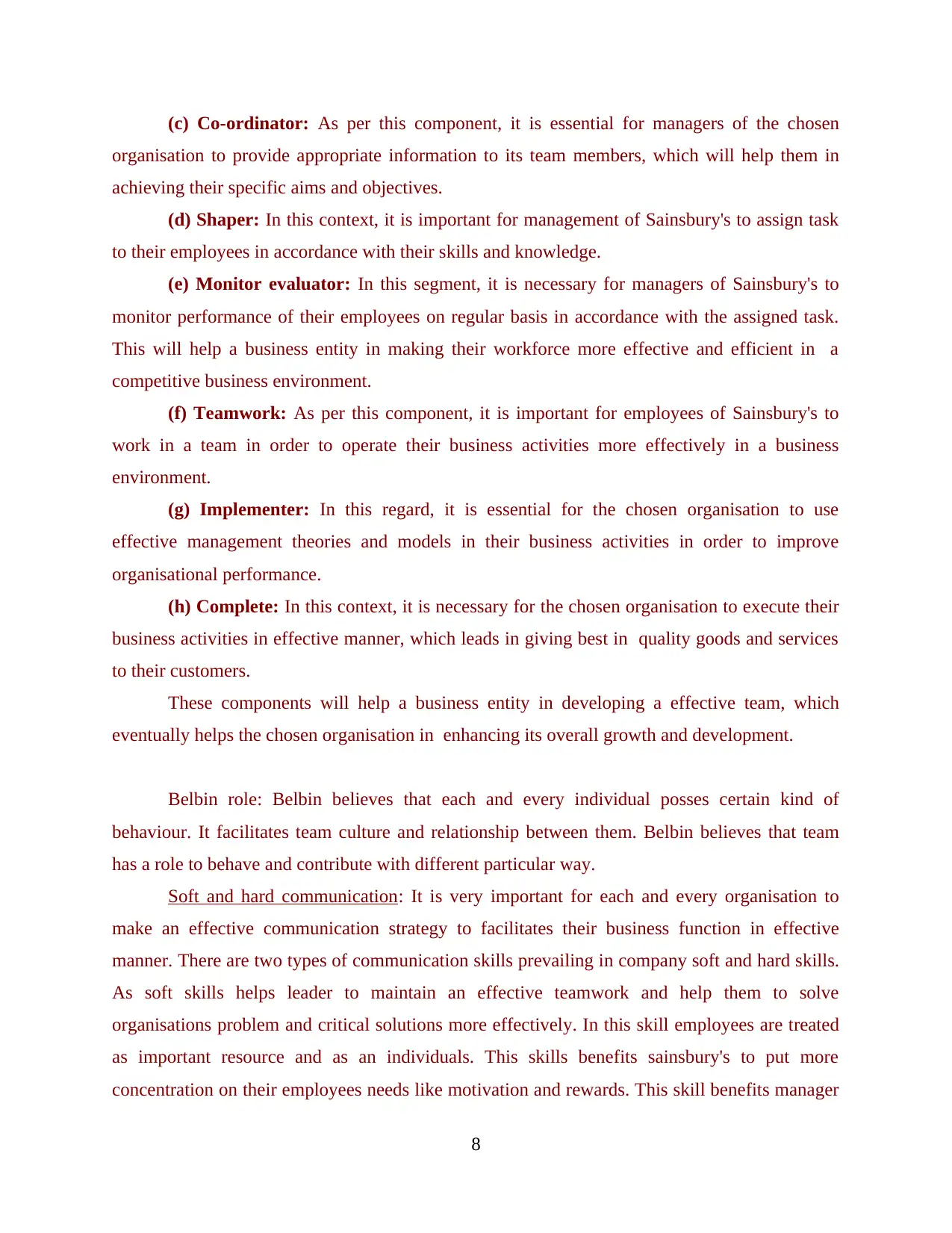
(c) Co-ordinator: As per this component, it is essential for managers of the chosen
organisation to provide appropriate information to its team members, which will help them in
achieving their specific aims and objectives.
(d) Shaper: In this context, it is important for management of Sainsbury's to assign task
to their employees in accordance with their skills and knowledge.
(e) Monitor evaluator: In this segment, it is necessary for managers of Sainsbury's to
monitor performance of their employees on regular basis in accordance with the assigned task.
This will help a business entity in making their workforce more effective and efficient in a
competitive business environment.
(f) Teamwork: As per this component, it is important for employees of Sainsbury's to
work in a team in order to operate their business activities more effectively in a business
environment.
(g) Implementer: In this regard, it is essential for the chosen organisation to use
effective management theories and models in their business activities in order to improve
organisational performance.
(h) Complete: In this context, it is necessary for the chosen organisation to execute their
business activities in effective manner, which leads in giving best in quality goods and services
to their customers.
These components will help a business entity in developing a effective team, which
eventually helps the chosen organisation in enhancing its overall growth and development.
Belbin role: Belbin believes that each and every individual posses certain kind of
behaviour. It facilitates team culture and relationship between them. Belbin believes that team
has a role to behave and contribute with different particular way.
Soft and hard communication: It is very important for each and every organisation to
make an effective communication strategy to facilitates their business function in effective
manner. There are two types of communication skills prevailing in company soft and hard skills.
As soft skills helps leader to maintain an effective teamwork and help them to solve
organisations problem and critical solutions more effectively. In this skill employees are treated
as important resource and as an individuals. This skills benefits sainsbury's to put more
concentration on their employees needs like motivation and rewards. This skill benefits manager
8
organisation to provide appropriate information to its team members, which will help them in
achieving their specific aims and objectives.
(d) Shaper: In this context, it is important for management of Sainsbury's to assign task
to their employees in accordance with their skills and knowledge.
(e) Monitor evaluator: In this segment, it is necessary for managers of Sainsbury's to
monitor performance of their employees on regular basis in accordance with the assigned task.
This will help a business entity in making their workforce more effective and efficient in a
competitive business environment.
(f) Teamwork: As per this component, it is important for employees of Sainsbury's to
work in a team in order to operate their business activities more effectively in a business
environment.
(g) Implementer: In this regard, it is essential for the chosen organisation to use
effective management theories and models in their business activities in order to improve
organisational performance.
(h) Complete: In this context, it is necessary for the chosen organisation to execute their
business activities in effective manner, which leads in giving best in quality goods and services
to their customers.
These components will help a business entity in developing a effective team, which
eventually helps the chosen organisation in enhancing its overall growth and development.
Belbin role: Belbin believes that each and every individual posses certain kind of
behaviour. It facilitates team culture and relationship between them. Belbin believes that team
has a role to behave and contribute with different particular way.
Soft and hard communication: It is very important for each and every organisation to
make an effective communication strategy to facilitates their business function in effective
manner. There are two types of communication skills prevailing in company soft and hard skills.
As soft skills helps leader to maintain an effective teamwork and help them to solve
organisations problem and critical solutions more effectively. In this skill employees are treated
as important resource and as an individuals. This skills benefits sainsbury's to put more
concentration on their employees needs like motivation and rewards. This skill benefits manager
8
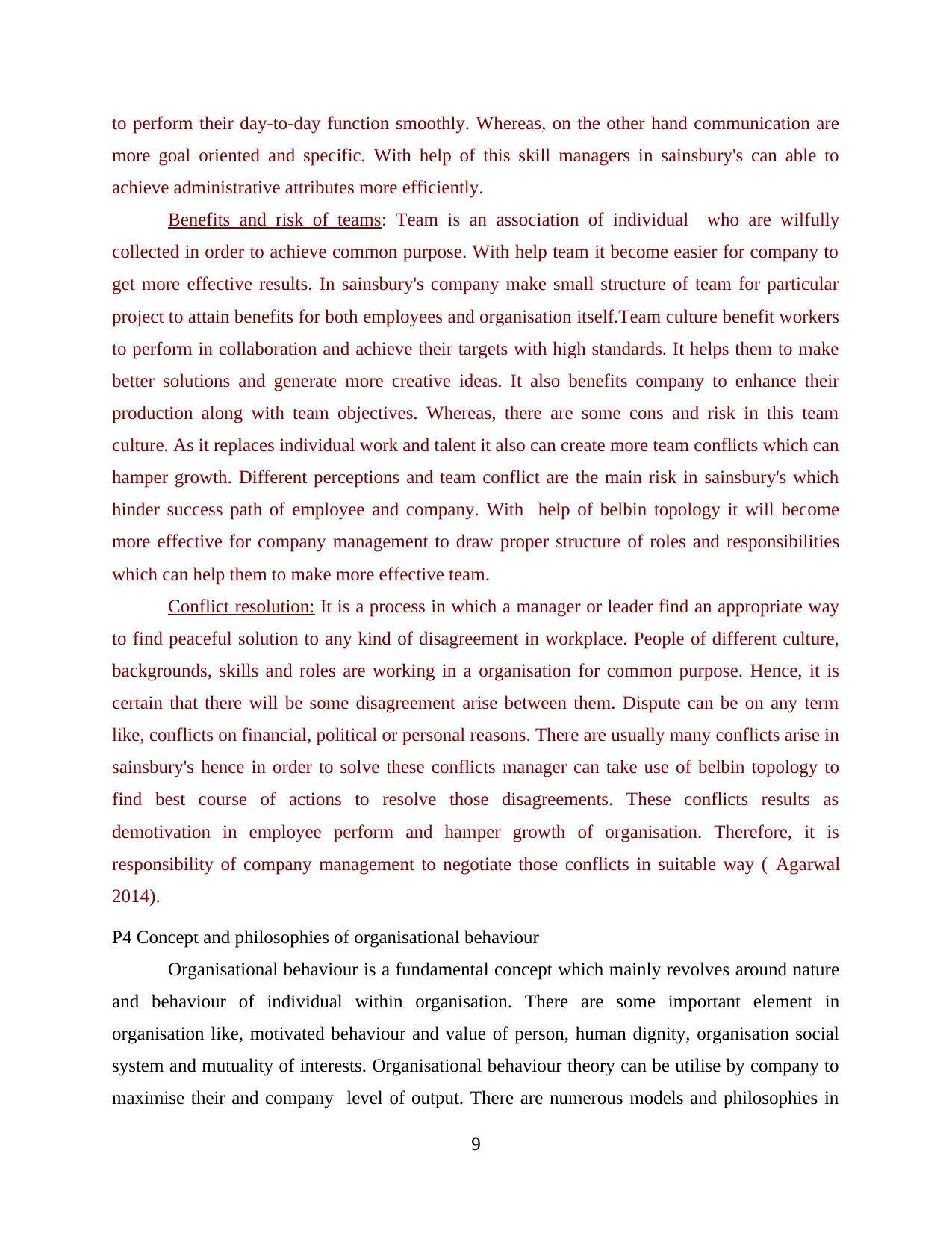
to perform their day-to-day function smoothly. Whereas, on the other hand communication are
more goal oriented and specific. With help of this skill managers in sainsbury's can able to
achieve administrative attributes more efficiently.
Benefits and risk of teams: Team is an association of individual who are wilfully
collected in order to achieve common purpose. With help team it become easier for company to
get more effective results. In sainsbury's company make small structure of team for particular
project to attain benefits for both employees and organisation itself.Team culture benefit workers
to perform in collaboration and achieve their targets with high standards. It helps them to make
better solutions and generate more creative ideas. It also benefits company to enhance their
production along with team objectives. Whereas, there are some cons and risk in this team
culture. As it replaces individual work and talent it also can create more team conflicts which can
hamper growth. Different perceptions and team conflict are the main risk in sainsbury's which
hinder success path of employee and company. With help of belbin topology it will become
more effective for company management to draw proper structure of roles and responsibilities
which can help them to make more effective team.
Conflict resolution: It is a process in which a manager or leader find an appropriate way
to find peaceful solution to any kind of disagreement in workplace. People of different culture,
backgrounds, skills and roles are working in a organisation for common purpose. Hence, it is
certain that there will be some disagreement arise between them. Dispute can be on any term
like, conflicts on financial, political or personal reasons. There are usually many conflicts arise in
sainsbury's hence in order to solve these conflicts manager can take use of belbin topology to
find best course of actions to resolve those disagreements. These conflicts results as
demotivation in employee perform and hamper growth of organisation. Therefore, it is
responsibility of company management to negotiate those conflicts in suitable way ( Agarwal
2014).
P4 Concept and philosophies of organisational behaviour
Organisational behaviour is a fundamental concept which mainly revolves around nature
and behaviour of individual within organisation. There are some important element in
organisation like, motivated behaviour and value of person, human dignity, organisation social
system and mutuality of interests. Organisational behaviour theory can be utilise by company to
maximise their and company level of output. There are numerous models and philosophies in
9
more goal oriented and specific. With help of this skill managers in sainsbury's can able to
achieve administrative attributes more efficiently.
Benefits and risk of teams: Team is an association of individual who are wilfully
collected in order to achieve common purpose. With help team it become easier for company to
get more effective results. In sainsbury's company make small structure of team for particular
project to attain benefits for both employees and organisation itself.Team culture benefit workers
to perform in collaboration and achieve their targets with high standards. It helps them to make
better solutions and generate more creative ideas. It also benefits company to enhance their
production along with team objectives. Whereas, there are some cons and risk in this team
culture. As it replaces individual work and talent it also can create more team conflicts which can
hamper growth. Different perceptions and team conflict are the main risk in sainsbury's which
hinder success path of employee and company. With help of belbin topology it will become
more effective for company management to draw proper structure of roles and responsibilities
which can help them to make more effective team.
Conflict resolution: It is a process in which a manager or leader find an appropriate way
to find peaceful solution to any kind of disagreement in workplace. People of different culture,
backgrounds, skills and roles are working in a organisation for common purpose. Hence, it is
certain that there will be some disagreement arise between them. Dispute can be on any term
like, conflicts on financial, political or personal reasons. There are usually many conflicts arise in
sainsbury's hence in order to solve these conflicts manager can take use of belbin topology to
find best course of actions to resolve those disagreements. These conflicts results as
demotivation in employee perform and hamper growth of organisation. Therefore, it is
responsibility of company management to negotiate those conflicts in suitable way ( Agarwal
2014).
P4 Concept and philosophies of organisational behaviour
Organisational behaviour is a fundamental concept which mainly revolves around nature
and behaviour of individual within organisation. There are some important element in
organisation like, motivated behaviour and value of person, human dignity, organisation social
system and mutuality of interests. Organisational behaviour theory can be utilise by company to
maximise their and company level of output. There are numerous models and philosophies in
9
⊘ This is a preview!⊘
Do you want full access?
Subscribe today to unlock all pages.

Trusted by 1+ million students worldwide
1 out of 16
Related Documents
Your All-in-One AI-Powered Toolkit for Academic Success.
+13062052269
info@desklib.com
Available 24*7 on WhatsApp / Email
![[object Object]](/_next/static/media/star-bottom.7253800d.svg)
Unlock your academic potential
Copyright © 2020–2026 A2Z Services. All Rights Reserved. Developed and managed by ZUCOL.





